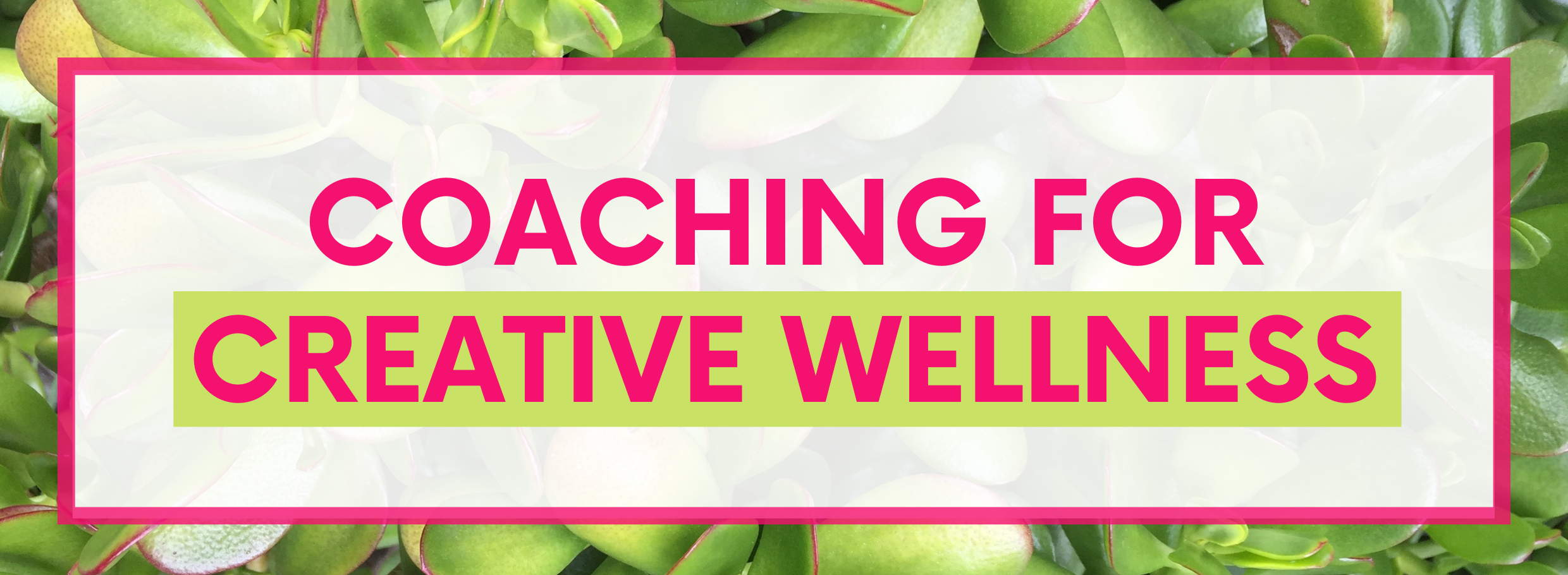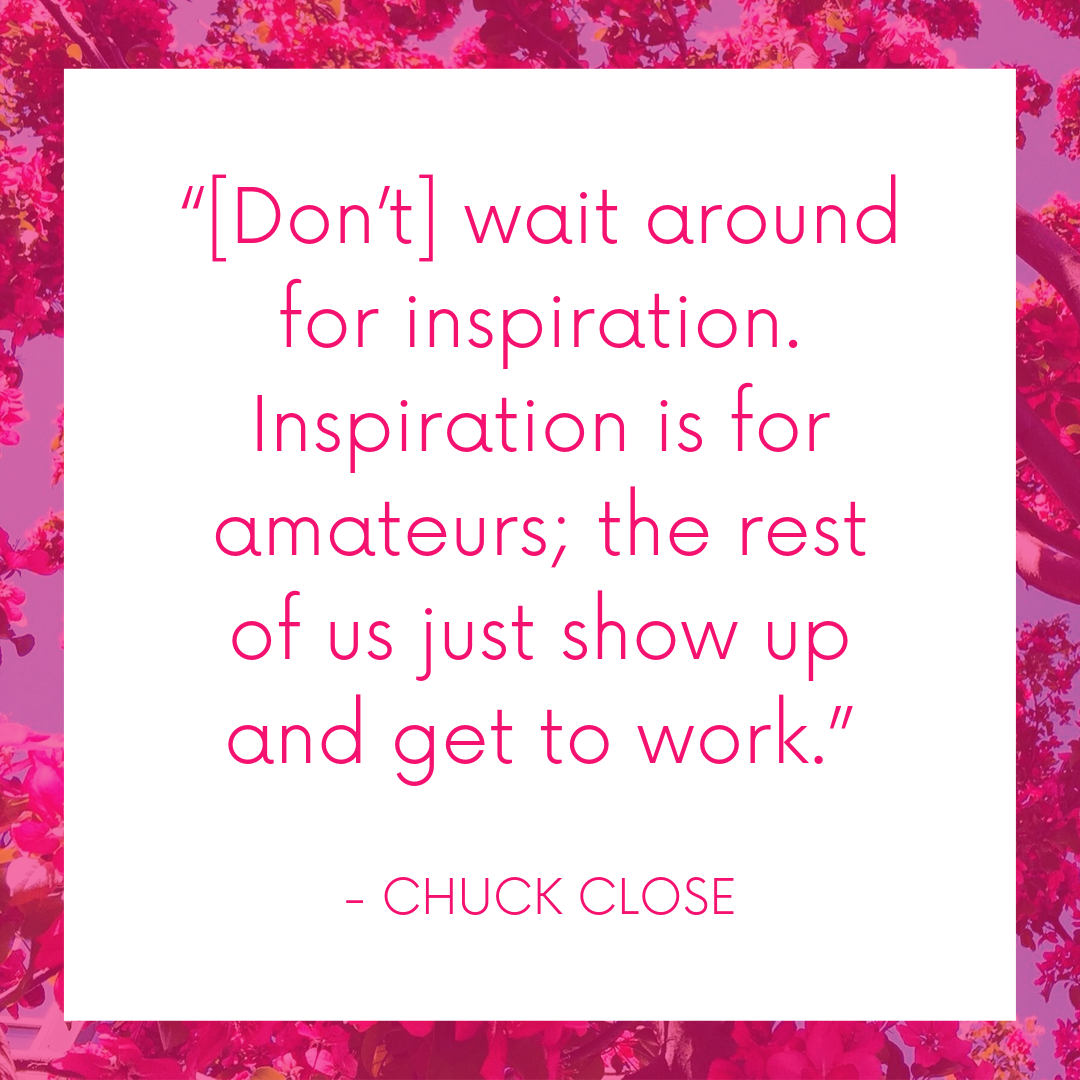What To Do When You Can't Find Creative Inspiration
Inspiration is overrated.
Okay, let me rephrase that - inspiration is awesome, but the way we think about it is overrated. We’ve all seen the romanticized depiction of a poet, painter, or songwriter sitting down as inspiration strikes, a drug-like magic while the excitement of the idea pulses through them and they create their work in a furious flash.
That totally does happen sometimes, but what we don’t hear about are all of the days when we sit down to our creative practice and nothing happens right away, or we make something we don’t like that much. That’s not only normal, but way more common than the magic described above.
Or worse, an idea comes when you can’t capture it, the energy rushes through, the stagecoach turns into a pumpkin, and that magic is lost, maybe forever.
You probably know that I’m a big believer in forming a regular creative practice in order to create the conditions for inspiration instead of just waiting around for it to come if it wishes. I quote this all of the time, but, like the artist Chuck Close says, “[Don’t] wait around for inspiration. Inspiration is for amateurs, the rest of us just show up and get to work.”
That is, of course, easier said than done - even if you are committed to making your creative practice a daily habit, there can be all kinds of resistance to work through.
But, the fact remains: some days we’re just not feeling it.
One of the challenges I hear most often from my clients is around motivation, but you don’t have to wait to feel motivated or inspired in order to get things done.
Here are some tricks and mindset shifts for showing up and doing the work anyway, even when you’re not in the mood to create:
Do something else that feels good (then get back to it)
Figure out a small action that would feel good - maybe it’s eating a square of chocolate, listening to a song you love, taking a minute to stretch, or petting your dog or cat. Anything to get you in a more positive vibe can only help.
Once I was in a tired/anxious mood and I fully turned it around heading to the piano (away from a screen!) to play some deeply-grooving samba while standing and kind of dancing around as much as one can while also staying close enough to still play the piano. (Full disclosure: It looked silly, I’m glad no one was watching.) It totally changed my mindset and got me excited to write!
Sometimes a change of scenery can be just the stimulation your brain needs, too. Although we pianists can’t take our instruments with us, lots of creative work is portable, or a quick swap can make it portable (like sketching instead of oil painting). Just the act of taking a walk or a short jaunt to the coffee shop can get your mind in a different place so you have new ideas when you return.
Give yourself permission to create whatever comes out
I have definitely gone through dry spells for months, even years at a time, and often the biggest thing that keeps me in the rut is that I got out of the habit of showing up and writing SOMETHING, no matter what. If you’re also an all-or-nothing kind of person when it comes to keeping habits, I’m sure you understand.
When the creations are few and far between, it’s so easy to build up the importance of each one so much that you’re paralyzed and just don’t start at all. The great thing about writing more often is that each creation is worth less, on average. That doesn’t sound good at first, but, hear me out - if each thing you create is worth less, it doesn’t really matter if it’s bad, because you’ll just make another one!
Try letting your inner child be in charge for a bit - as Tom Waits once said, “Children make up the best songs, anyway. Better than grown-ups. Kids are always working on songs and throwing them away, like little origami things or paper airplanes. They don't care if they lose it; they'll just make another one.”
So, if you’re freaking out about not having any good ideas, just gently try to let that anxiety go, and remember that we always have to create lots of less-good stuff in order to get to the good stuff. Ira Glass sums this problem up pretty well:
So that means creating anything, regardless of its quality, is still a critical part of your creative process and evolution as a creative person. In other words, kindly tell your inner judge to pipe down (at least temporarily), and just create.
You can even take that idea one step further, and just decide to write something "bad" on purpose. Odds are, it won’t be that bad, and it’ll help you release any pressure you might be putting on yourself to create something great.
Invite ease
What would it feel like if it were easy?
There’s this subconscious idea that work should be hard, and our society has drilled into us the virtue of hard work, so we build up this idea that it’ll be hard, then subconsciously make it true and are afraid to get started with our creative work. Sure, some things are hard, but that shouldn’t be our default setting!
Look for ways that you might be overcomplicating the process, and then just take it step by step.
If something feels hard, or you think “Ugh, I can’t do this,” remind yourself that I can (and will!), and that it won’t be as difficult as you fear.
Make the process more enjoyable - have a fun beverage (whatever that means to you), get up to move around regularly, and give yourself breaks to lie down if you’re out of energy at the moment. Otherwise you might find yourself back in front of a screen with the Digital Munchies.
Try your best to avoid feeling busy or frantic, by not rushing, walking more slowly, and accepting the amount of work you can do in a day.
Of course, this is all a practice, but a shift in perception can be the root solution to getting unstuck, and might be all you need to feel capable, empowered, and motivated to create.
Trust that the creation will come
One of the hardest things about the creative process is trusting the process, even when inspiration is nowhere in sight. We have to trust that the creation will come, often while forging ahead blindly.
Look to nature for inspiration - (in places that have seasons), trees don’t flower or even have leaves all year long, but they always come back to life again in the spring. I find it really helpful to think of the creative process in this same seasonal way. There might be some incubation involved, and that’s okay, totally normal, even!
Get quiet, close your eyes and listen to or see whatever pops into your head. It might only be a few notes, a blurry shape, or a short phrase, but no matter, it’s a starting point. That little snippet could be something that you create variations on, or at least be enough to get you started!
Remember that these moments when you have no clue what to do next are an extremely common, normal part of the creative process. I guarantee that every artist you know, and all of “the greats” have experienced them, too, so you’re definitely not alone.
Just focus on the next step, whatever that is. Then the next one…
Get random/unexpected!
Sometimes you just need to look outside of your normal limits to get you started.
Try doing the opposite of what you normally do. (On an old Seinfeld episode, George did this, and got some unexpectedly great results!)
Here are a bunch of random generators that may spark an idea:
Random jazz scale generator (they're not necessarily all jazz scales, but different collections of notes, nonetheless)
Be prepared
You never know when an idea will strike, so having the tools at hand to capture ideas is essential! I always have 2 little notebooks with me - one with regular lined paper, and one with mini staff paper in case I have to notate some music. I often find myself getting a lot of concept and content writing ideas while playing the piano, especially while accompanying (only when the music isn’t too hard). While I’m at my school accompanying job, I keep a notebook out to scribble down ideas during the down time when I’m not playing. I also get tons of great ideas in the shower, so I bought a waterproof notebook, which has led to some fruitful brainstorming!
One of the stories from Elizabeth Gilbert’s book Big Magic always sticks with me: when the poet Ruth Stone was young, working in the fields of her family farm, “she would sometimes hear a poem coming toward her — hear it rushing across the landscape at her, like a galloping horse. Whenever this happened, she knew exactly what she had to do next: She would ‘run like hell’ toward the house, trying to stay ahead of the poem, hoping to get to a piece of paper and a pencil fast enough to catch it. That way, when the poem reached her and passed through her, she would be able to grab it and take dictation, letting the words pour forth onto the page.”
So always be ready, this sends a message to inspiration, the muse, or however you like to think of creative forces, that it’s welcome.
I hope these ideas can help you get started when you’re feeling stuck or resistant - it happens to all of us! If that’s where you’re at right now, I’m here to support you!
You can sign up for a free 30-minute discovery call here (or ask questions via Voxer) to start on your journey back to getting in a groove with your creative practice.
What’s your favorite way to get yourself going when inspiration is lacking? Feel free to share in the comments!
Pianist and composer


